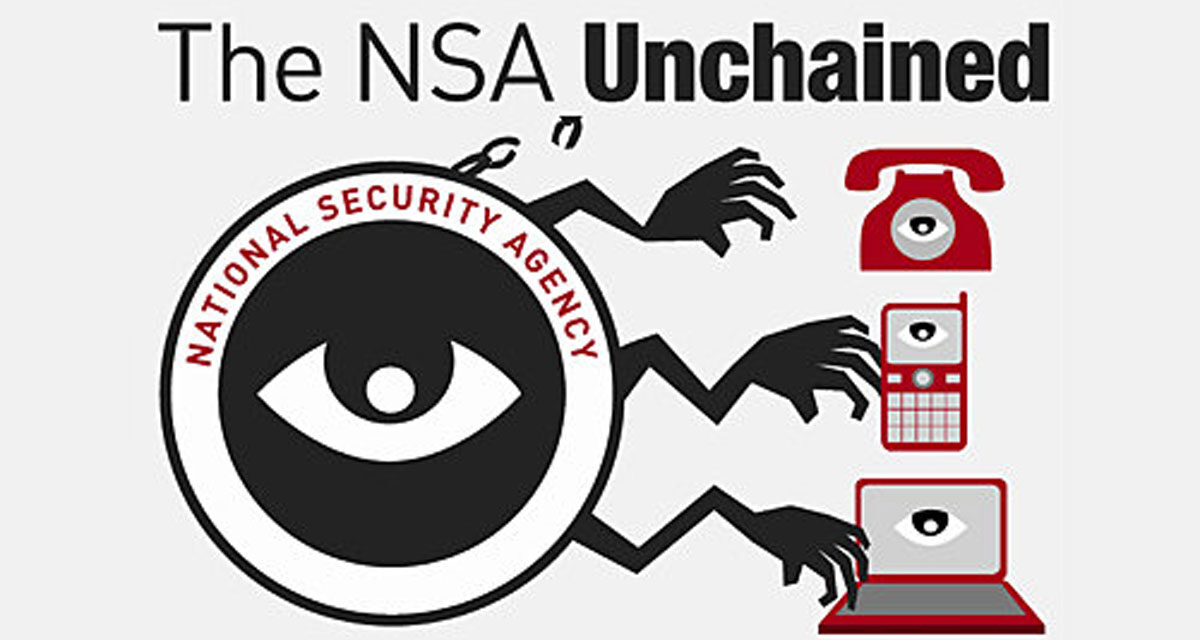
The Intrusion Within: Unveiling the Extent of U.S. Intelligence Agencies’ Data Gathering on American Citizens

In the digital age, where personal data is bought and sold with ease, the need to protect the privacy of U.S. citizens from its own intelligence services has become a paramount concern. Recent revelations have shed light on the U.S. intelligence community’s extensive acquisition of Americans’ personal information from various sources, raising valid apprehensions regarding the potential infringement on civil liberties.
A newly released report, commissioned by Director of National Intelligence Avril Haines, calls for a comprehensive review of the intelligence gathering practices, urging a more cautious approach to the acquisition of commercially available information (CAI).
The report highlights the critical nature of the data being collected, emphasizing that CAI encompasses highly sensitive details about individuals that were historically obtained only through targeted surveillance methods. It underscores the urgent need for the intelligence community to develop refined approaches that strike a delicate balance between national security and the protection of citizens’ constitutional rights.
Private-sector contracts utilized by the government to access personal data are brought to the forefront in the report. It reveals that certain agencies have contracted with external entities to gain access to individuals’ data for various purposes. While such collaborations may have legitimate intentions, they raise legitimate concerns about the potential erosion of privacy safeguards and the impact on individual freedoms.
Director Haines’ commitment to transparency and sharing information with the American people is commendable. However, Senator Ron Wyden and other lawmakers have rightfully voiced concerns over the lack of oversight and legal protections surrounding the acquisition of personal data. They argue that stronger safeguards are necessary to ensure that government surveillance does not encroach upon the rights of U.S. citizens. The potential abuse of acquired data and its vulnerability to foreign adversaries further underscores the need for comprehensive legislation and clear guidelines to govern these practices.
Senator Wyden and his colleagues advocate for a legislative approach to address these concerns. Their proposed bipartisan legislation aims to restrict the acquisition of Americans’ personal data by foreign adversaries and calls for the establishment of robust safeguards. Recognizing the need to strike a balance between security and privacy, they seek to define clear restrictions on the export of data, protecting citizens’ information and guarding against potential misuse.
It is crucial to remember that the principles enshrined in the Constitution, such as the protection against unreasonable searches and seizures, form the bedrock of American democracy. As the intelligence community navigates the complexities of the digital era, it must do so with utmost respect for these constitutional traditions and societal expectations. The acquisition of personal data should never be a means to compromise the privacy and civil liberties of U.S. citizens.
It is essential that the intelligence community recognizes and addresses the concerns surrounding the acquisition of Americans’ personal data. Striking a balance between national security imperatives and the protection of civil liberties is of utmost importance. By implementing robust safeguards, adhering to legal frameworks, and fostering transparency, we can ensure that intelligence gathering practices respect the privacy and rights of every individual, thus upholding the fundamental principles upon which our nation was founded.
Editor’s note: What business do the CIA, NSA or other U.S. intelligence service have gathering data about U.S. citizens? Theoretically (perhaps not more than that right now), they should not operate against U.S. “persons” at all. The FBI is the federal government’s investigatory body inside the U.S. and they are required to use due process. That means warrants issued by judges. The wholesale gathering of personal data of U.S. citizens is wrong on every level.






























Yeah ok, so lets throw a law at it. That will make it all better.
I think the key here is that what they are gathering is as the article says, “more cautious approach to the acquisition of commercially available information (CAI).” How is it unreasonable search and seizure if it is commercially available? Google uses it all the time to send you ads. Gosh I hope the new laws will stop that too!!!
So far, I have not felt like my privacy or civil liberties have been violated. So they must be doing a pretty good job!
“Striking a balance between national security imperatives and the protection of civil liberties is of utmost importance. By implementing robust safeguards, adhering to legal frameworks, and fostering transparency, we can ensure that intelligence gathering practices respect the privacy and rights of every individual.” Yup!!! And this will ensure the domestic terrorists living among us are safe as well!!! And then as soon as another building comes down people will be screaming, “Where’s the government? How could this happen? Why didn’t they know about these people? blah blah blah.”
The issue is simple, “What are we willing to give up to ensure our safety from terrorists?” I think if one digs deeper into the NSA one will find that this is basically nothing more than a net that starts the process of identifying “potential” and that once a person of interest is identified, then other processes requiring warrants kick in, and probable cause is still needed for an arrest. IF you want maximum protection of your privacy and civil liberties, then reduce your commercial digital footprint by doing these things: Always use cash, never go on the internet, only work jobs that pay you cash, not a paycheck, do not belong to any organizations, do not have any investment accounts or retirement accounts, never fly on a plane, live in a city where you can take a taxi, never have a driver’s license, always pay medical providers in cash, do not have a medical insurance policy, do not use a cell phone or have any phone accounts or cable tv accounts, blah blah blah.
Are you getting the picture yet???? You can do much on your own to decrease your digital footprint and feed your paranoia about loosing your privacy and precious civil liberties!
If you are willing to give up freedom for security, then you deserve neither.
You are perfectly correct with that response. Tom would be what they used to call a “Useful Idiot”. He believes that if something may not be a problem for him, then it must be OK for everybody. What a self-centered fool.
Joe, then you already have neither since you freely gave in with the Patriot Act. And then maintained, renewed…… Unfortunately it’s always a trade-off, not a binary win or lose, and during times of violence like war or attack, freedom often gets prioritized lower. As it always has been since before the founders.
On this one, once again we ask: DO or AI? “Prove yourself brave, truthful and unselfish, and someday you *will* be a real boy.” Let’s take this well-written word sandwich apart to see what the machine came up with this time. Well written, as usual, but seemingly disjointed with large gaps in logic. Not sure the actual primary subject, CAI, international versus domestic surveillance, Congress, the IC, or what. Seems to be a bit of a blend of two or more topics as if one. Here we go, let’s break it down:
The DO-lead: “In the digital age, where personal data is bought and sold with ease, the need to protect the privacy of U.S. citizens from its own intelligence services has become a paramount concern.” OK, main topic must be the IC getting domestic data. Houston, we have lift-off: “Recent revelations have shed light on the U.S. intelligence community’s extensive acquisition of Americans’ personal information from various sources, raising valid apprehensions regarding the potential infringement on civil liberties.” OKdoky, sounds reasonable enough as a general goal even if the story offers zero proof of recent infringement revelations by the IC gone wild unless you feel the Weaponization Weenies have won. So, why now?
“A newly released report, commissioned by Director of National Intelligence Avril Haines, calls for a comprehensive review of the intelligence gathering practices, urging a more cautious approach to the acquisition of commercially available information (CAI).” Aha, a new report, cautious approach to getting CAI. Caution is good, new is good. Although it does not mention the IC or foreign surveillance as the target. Plus, it’s a 2023 public release of a 2022 classified report using 2021 data, or earlier….. but hey, why sweat the small stuff when DO says, the report says:
“CAI encompasses highly sensitive details about individuals that were historically obtained only through targeted surveillance methods.” OK, it’s easier to get in the digital world, plus more tracked, anyone can get it, and now it’s highly sensitive, although everyone can get it, free or for a price so one might argue it USED to be highly sensitive, but only because you couldn’t get it. A minor point, the report still leads to:
“It underscores the urgent need for the intelligence community to develop refined approaches that strike a delicate balance between national security and the protection of citizens’ constitutional rights.” Sounds cool EXCEPT that the report does not say this, DO seems to be taking a tangent from topic. Just seems to defy logic why a governor is needed by the IC for commercially available info. Why block them if everyone else can see it? Wouldn’t the restriction be placed on those creating the sensitive info? Seems the story is going off the rails of logic……but wait, there’s more…
“Private-sector contracts utilized by the government… they raise legitimate concerns about the potential erosion of privacy safeguards and the impact on individual freedoms,” except it’s CAI, anyone can get it. Who cares if the private-sector pulls it together, the data is still there, still accessible. Or is this a subtle segue to the topic of censorship of CAI?
“Senator Ron Wyden and other lawmakers have rightfully voiced concerns over the lack of oversight and legal protections surrounding the acquisition of personal data.” Now we add a Senator, no doubt reacting to the report, Uh, CAI, right? Oversight for CAI? Sounds relevant.
“They argue that stronger safeguards are necessary to ensure that government surveillance does not encroach upon the rights of U.S. citizens.” OK, now we are back off the rails again. Seems we are confusing the ability to produce data, censorship, with the ability to acquire data — as in be allowed to purchase it or access restrictions upon it. IOW, the story confuses the need not to have the data anywhere, as in restricting what can even be produced by anyone in the first place with the concept of just stopping our government from accessing available data just to be able to data-stomp its citizens. IOW, do you want the data anywhere and/or do you want our government to know less than other governments? Less than citizens can know? Google? Twitter? That’s one brick shy of a wall thinking.
“The potential abuse……vulnerability to foreign adversaries……need for comprehensive legislation and clear guidelines to govern these practices.” CAI again, right? Or just the government’s access to CAI? Foreigners get it, and you want to restrict our government?
And back to: “Senator Wyden…..restrict the acquisition of Americans’ personal data by foreign adversaries.” CAI… and just dem damned furners again and then:
In conclusion: “It is crucial to remember…..Constitution…….protection against unreasonable searches and seizures……As the intelligence community navigates the complexities of the digital era, it must do so with utmost respect for these constitutional traditions and societal expectations. The acquisition of personal data should never be a means to compromise the privacy and civil liberties of U.S. citizens.” Seems like we are back to our Intelligence Community’s ability to access CAI versus limiting CAI for foreigners or, a better idea, just limiting CAI itself for domestic, government, and foreign access as in ==== this info is illegal, it’s sale not pass. CAI of this type is illegal to collect, own, or sell…. Surely this story can not pass, except…..epilogue!!!!
“Editor’s note: What business do the CIA, NSA or other U.S. intelligence service have gathering data about U.S. citizens?” Now that’s always a damned good question. Just not one posed by the Report OR Senator Wyden’s bill who are targeting foreigners.
“Theoretically (perhaps not more than that right now), they should not operate against U.S. “persons” at all.” A no-brainer, but not part of either the report or Senator Wyden’s bill. Just a free turd of advice I guess….
Bottom Line: DO acts like AI: sounds real nice, but when you look closely, just does not make logical sense. This like two stories pasted together and then textually shoehorned to appear as one story, one thing something concluded they are the same. “Prove yourself brave, truthful and unselfish, and someday you *will* be a real boy.”
The concept is simple: Congress should agree what personal information s legal for commercial use and what’s illegal for CAI from all providers. Boom, problem solved about who can see what and who can access stuff that they should not access because of the Constitution. That simply solves the CAI issue and you really don’t have to care about who is buying what CAI info.. THEN — a second issue would be to decide which US org’s can look domestically (FBI, not CIA, with NSA being in the grey zone in that it CAN surveil domestic IF there’s a foreign component. This means, if appropriate, NSA can surveil a 100% domestic communications if a foreign element can be proven. This should already be done and we can debate the NSA exemption which I think is the patriot act in action. Think that’s what the story was attempting to cover but the public release of the new report, the Weaponization Weenie attacks, and the Spring revision of the Wyden bill seems to have thrown a clog into DO’s machine response confusing a number of topics.
As to the real story:
The report alluded to here was generated in 1/22, released to public in 1/23, so much for transparency. It deals with how the IC should process CAI, not foreign access to CAI in general. It has three recommendations: “First, the IC should develop a multi-layered process to catalog, to the extent feasible, the CAI that IC elements acquire. This will be a complex undertaking requiring attention to procurement contracts, functionally equivalent data acquisition processes, data flows, and data use. The IC cannot understand and improve how it deals with CAI unless and until it knows what it is doing with CAI. Second, based on that knowledge, the IC should develop a set of adaptable standards and procedures for CAI, governing and requiring regular re-evaluation of acquisition and other decisions. Third, as part of this set of standards and procedures, and/or as a complement to it, the IC should develop more precise sensitivity and privacy-protecting guidance for CAI. PAI is no longer a good proxy for non-sensitive information; today, much CAI is very sensitive, and the IC therefore needs to develop more refined approaches.” These are the three recommendations made, not the stuff DO is talking about….
Wyden’s bill does target CAI but more importantly UNRESTRICTED COMMERICIAL DATA, PAI and CAI, although God only knows how they implement the last one given it’s commercially available UNLESS they restrict what is CAI. The Wyden bill is based on a warning from Haines from early 2021 when she: warned of threats by unrestricted commercial data sales, not CAI, but unrestricted commercial access. And in a short TWO YEARS, Congress is moving at the speed of Congress with The Protecting Americans’ Data from Foreign Surveillance Act, as an update the previously introduced bill to include new protections against foreign-owned companies like TikTok accessing U.S. data from abroad, or sending data to unfriendly foreign nations.
The bill has been in committee since June of 2022. Not sure why the 2023 public release of 22 data from 2021 examples is news; but certainly the Wyden bill and the Haines report are two sides of the same slice of pizza, neither are the same nor are either, by themselves, or combined the complete story that should be told by DO, unless he’s AI and then “welcome to the machine,” and the disinformation therein, albeit really well-written misinformation.
And now you know the rest of the story, but why DO/AI seems to confuse the two into a story never told is a question, perhaps a question of man versus machine.